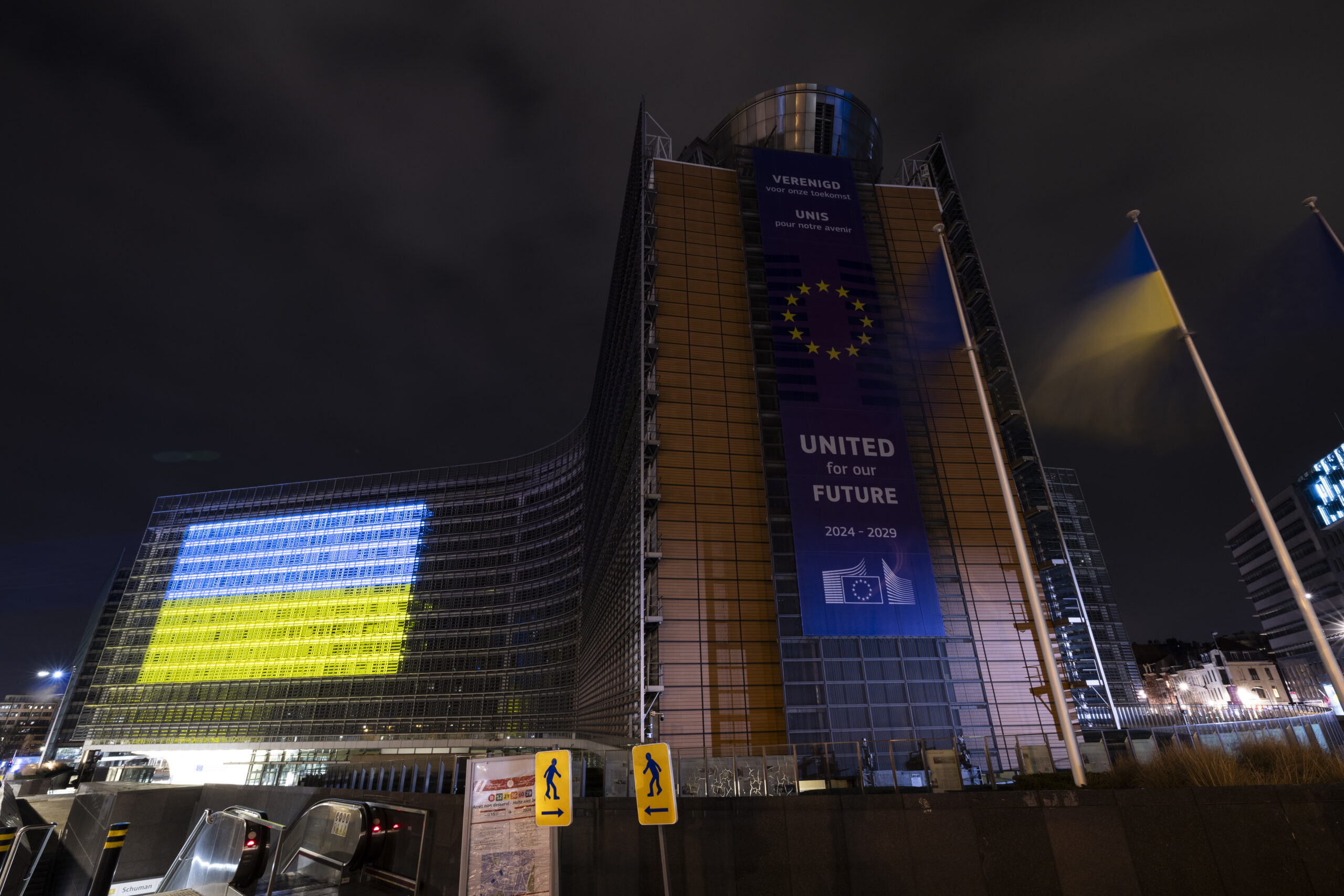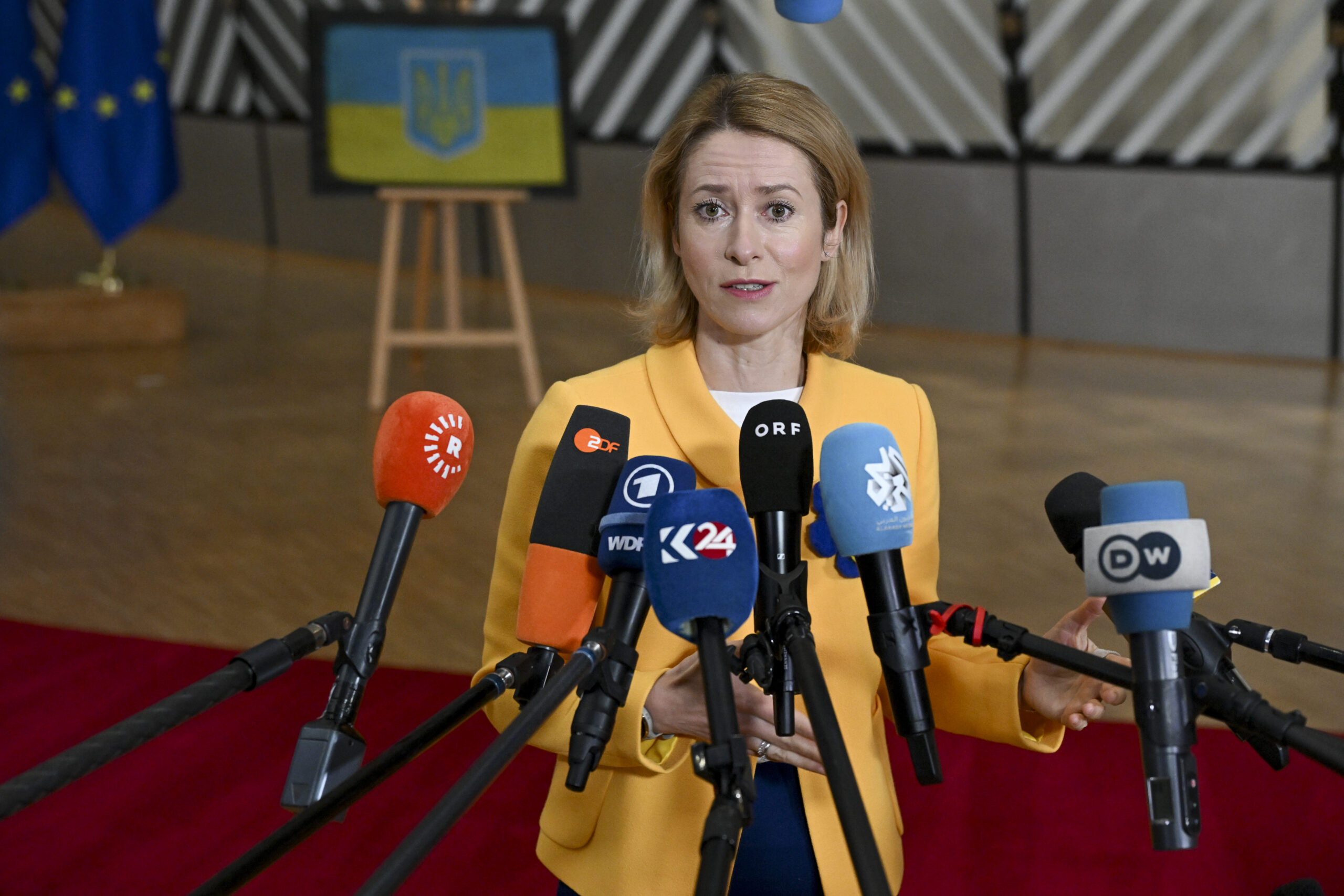Brussels – It took some time, but the EU’s response to the turn of events in Ukraine imposed by Donald Trump with a coordinated response announced on the third anniversary of the Russian invasion. António Costa convened an extraordinary European summit on Ukraine on March 6 and then set off for Kyiv with Ursula von der Leyen and the College of EU Commissioners. The European Commission president will announce a new 3.5 billion payment through the Ukraine Facility in the warring capital. Meanwhile, early this morning in Brussels, the foreign ministers of the 27 member states adopted the 16th sanctions package against Russia.
As the colors of the Ukrainian illuminate the buildings of European institutions in Brussels, EU leaders are gathering in Kyiv for an international summit to support the country under aggression. The support is as urgent as ever, especially after Trump’s attacks on Zelensky and the start of the dialogue between the White House and the Kremlin to end the conflict on their terms. She will deliver a speech, released in advance by her staff, stressing that “the only reason” for the war that has been tearing Ukraine apart for three years is “Putin’s imperial obsession.” Facing Zelensky’s government, von der Leyen will recall that “our Union and member states have supported Ukraine to the tune of 134 billion euros. That is more than anybody else.”

The support is more than that of the Atlantic ally, which threatens to disengage. To reiterate this with facts, von der Leyen will announce a new payment for Kyiv: in March, 3.5 billion euros will be ready from the Ukraine Assistance Facility, the 50 billion support mechanism over three years that the EU established, of which – so far – just over 8 billion has been released.
The third payment through the Ukraine Facility is modest compared to the ambitious 20 billion fund discussed for days in Brussels. However, after some wavering, this new facility will likely be at the center of the debate at the extraordinary European Council António Costa convened for March 6. “In my consultations with European leaders, I perceived a common commitment to address these challenges at the EU level: to strengthen European defense and to contribute decisively to peace on our continent and the long-term security of Ukraine,” the European Council president said, promising to “be ready to take decisions on March 6.”
Von der Leyen could outline the White Paper for Defense to EU heads of state and government at the extraordinary European summit, which the European Commission has scheduled for March. “I will present a comprehensive plan on how to scale up our European arms production and defense capabilities,” according to the leader’s speech in Kyiv. The EU sent a message from the Ukrainian capital to Washington (and Moscow): for von der Leyen, “a just and lasting peace comes only through strength.” Brussels was not about to give up now and please Putin. As the EU adopts a new sanctions package on Russia, the EU leader warns, “We will increase punitive sanctions against Russia unless they demonstrate true willingness to achieve a lasting peace agreement.”

After days of reflection and silence in the face of accelerating events in Ukraine, EU leaders are not holding back today. In a joint statement, von der Leyen, Costa, and European Parliament President Roberta Metsola reiterated that “Russia and its leadership bear sole responsibility for this war and the atrocities committed against the Ukrainian population.” They appeal overseas: “In a challenging international and geopolitical environment, we stress the importance of maintaining transatlantic and global solidarity with Ukraine.”
Meanwhile, in Brussels, where the foreign ministers of the 27 member states met in the morning, the EU High Representative for Foreign Affairs, Kaja Kallas, announced that she will travel to Washington tomorrow to meet with Secretary of State Marco Rubio (today it is Emmanuel Macron and Keir Starmer’s turn in the US capital). It will not be an easy confrontation for the head of EU diplomacy, chosen precisely because of her firmness as premier of Estonia toward Russia. Even Kallas, on the third anniversary of Russia’s invasion of Ukraine, seems to have taken courage: “If you look at the messages coming from the United States, it is clear that the Russian narrative is very strongly represented there,” she said upon her arrival at the EU Foreign Affairs Council.
English version by the Translation Service of Withub








